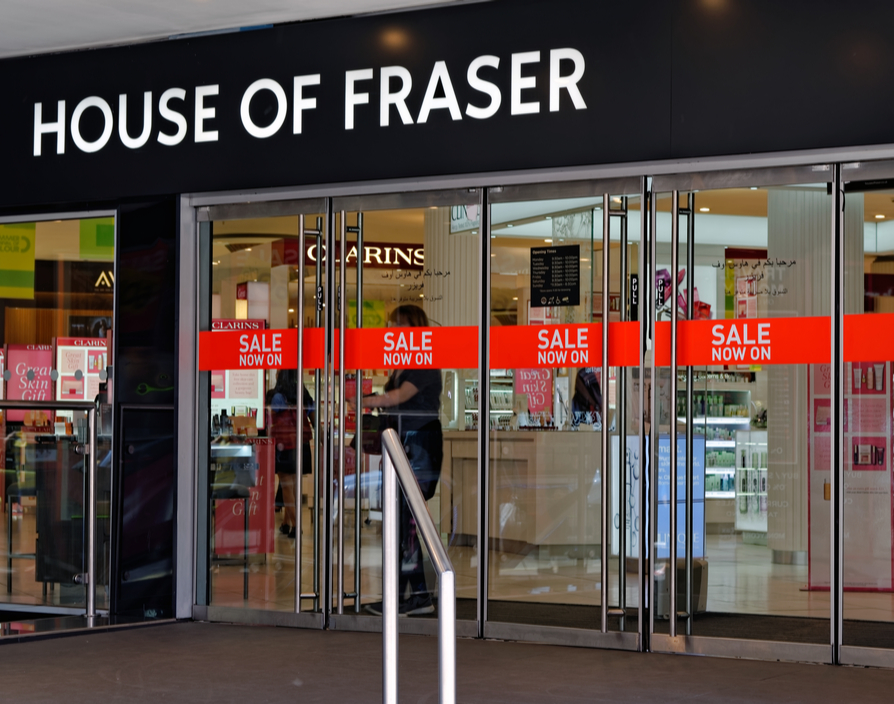It’s been a bleak few months for high street stores. Closures from Marks and Spencer, Maplin and Toys R Us make boarded-up windows a common sight down British roads. Now adding to a retail wasteland, House of Fraser has announced plans to axe 31 shops and cut 6,000 jobs nationwide. What’s going on with this industry?
It goes without saying that closures are survival mechanisms – a “brutal and grim” move which Alex Williamson, chief executive of House of Fraser, acknowledged was the only way to save the company. The empty shops left by retailers are therefore nothing more than skeletons left on the capitalist graveyard – testaments to the fact that businesses are all about the survival of the fittest. And it’s easy to see that the next step of the evolutionary ladder is online, especially given how ease, distance and convenience are far more prevalent on the web than in-store. “It’s no coincidence that on the same day [of Fraser’s announcement] Amazon announced a major hiring goal of 2,500 permanent roles in the UK,” remarked Graham Cooke, CEO of Qubit, the brand personalisation software.
Costly upkeep also accounts for a lot says Alexander Wood, partner and specialist at Coffin Mew, the law firm: “Landlords represent overhead costs and retailers are frankly desperate to push these costs down in order to survive. Those landlords with desirable property will be able to push back, those without will have little negotiating power – there is hardly a queue of prospective tenants at the door of each newly empty shop.”
It’s a burden online-only retailers are surely glad to be rid off. However, the benefits of existing outside cyberspace shouldn’t be forgotten. In fact, it’s something which Maxwell Scott, the online bag store, strives for. “As a predominantly online brand, our main motive for this year is to expand the business into wholesale in order to increase brand awareness,” said William Forshaw, CEO of Maxwell Scott.
“In terms of getting our brand out there, we believe that store presence in major retailers is the next step for us. However, with the recent closures at House of Fraser, it’s becoming evident that this strategy may not be the best avenue anymore. Ironically, as a brand that developed digitally first, we are now seeing the need for traditional bricks-and-mortar retail as a way to get our brand out there to the public.”
Just like Netflix has long been touted to be for cinema, the internet has been touted as the death of the high street. One person who is hopeful is Jenny Burns, CEO of KBS Albion, the creative transformation partner. “The problem isn’t technology, it’s new and emerging customer needs and behaviours that technology shapes. If retailers can understand customers they’ll know which new technology to adopt, acquire or invest in.
“The real challenge facing UK retail is one of leadership. How they will put the customer back at the heart of their business. How they will adopt new ways of working that will help them identify, respond to and quickly change to meet customers’ needs. How they will integrate their physical and digital estates – rather than treat them as silos – to help customers get their jobs done.”
So if high street dinosaurs don’t compete against frictionless e-commerce, what chance do they have? With online keeping brick and mortar stores on the backfoot, changes need to take place. Joe Rabah, EMEA manager director at RMG Networks, the digital signage company, summarised: “It’s essential that retailers use platforms that create frictionless purchasing experiences for their customers, enabling them to increase customer engagement that is tailored to individual customer needs and habits.”
Although there’s potential for physical stores to change, the reality can’t be ignored. For instance, flashback to Zavvi, the entertainment retail chain, which once boasted over 100 nationwide shops. Now, 11 years after formation, it’s stripped down to an online-exclusive service.
It’s a metamorphosis many consumers can start to expect of their favourite brands as Sam Rutley, managing director at PushON, the e-commerce agency, emphasised: “The knock-on effect for consumers is that, should retailers turn completely digital, they will miss out on key features associated with a bricks and mortar store, such as the ability to try items on within a physical changing room or to see what a piece of furniture looks like within a physical room.
“This will mean that retailers will have to improve their websites and consider investing in visualisation technologies such as augmented reality (AR), which can allow online shoppers to preview and place digital representations of products into real life settings via their handheld devices – effectively ‘trying before they buy”
The brick and mortar high street is becoming more barren with each new closure. But one company’s loss is another’s gain, with SMEs in particular becoming able to compete in fresh pasture without the looming shadows of retail giants. “Where SMEs often win out is at an in store experience level. When you have less stores it’s easier for them to become destinations for shoppers [as] they have a local support and personality that’s often readily backed up by a social media presence,” said Luke D’Arcy, president at Momentum Worldwide UK, the marketing agency.
“Being savvy with less traditional and more experience-led forms of promotion is something many SMEs will have had to upskill on from day one and it could pay off as traditional retailers start to struggle.”
Whether businesses migrate online to save cost and speed or adapt physical shopping to modern convenience, there won’t be a definitive exodus one way or the other. Most likely, those remaining alongside the pavement will do so because of a uniqueness that can’t be contained online – either local charm, sophisticated tech or sheer novelty. But, it’s best to find your niche now rather than later. ![]()
Share via:


















































